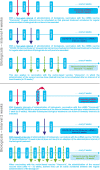COVID-19 vaccination of patients with allergies and type-2 inflammation with concurrent antibody therapy (biologicals) - A Position Paper of the German Society of Allergology and Clinical Immunology (DGAKI) and the German Society for Applied Allergology (AeDA)
- PMID: 33842829
- PMCID: PMC8028287
- DOI: 10.5414/ALX02241E
COVID-19 vaccination of patients with allergies and type-2 inflammation with concurrent antibody therapy (biologicals) - A Position Paper of the German Society of Allergology and Clinical Immunology (DGAKI) and the German Society for Applied Allergology (AeDA)
Abstract
Background: After the beginning and during the worldwide pandemic caused by the severe acute respiratory syndrome coronavirus type 2 (SARS-CoV-2), patients with allergic and atopic diseases have felt and still feel insecure. Currently, four vaccines against SARS-CoV-2 have been approved by the Paul Ehrlich Institute in Germany, and vaccination campaigns have been started nationwide. In this respect, it is of utmost importance to give recommendations on possible immunological interactions and potential risks of immunomodulatory substances (monoclonal antibodies, biologicals) during concurrent vaccination with the approved vaccines.
Materials and methods: This position paper provides specific recommendations on the use of immunomodulatory drugs in the context of concurrent SARS-CoV-2 vaccinations based on current literature.
Results: The recommendations are covering the following conditions in which biologicals are indicated and approved: 1) chronic inflammatory skin diseases (atopic dermatitis, chronic spontaneous urticaria), 2) bronchial asthma, and 3) chronic rhinosinusitis with nasal polyps (CRSwNP). Patients with atopic dermatitis or chronic spontaneous urticaria are not at increased risk for allergic reactions after COVID-19 vaccination. Nevertheless, vaccination may result in transient eczema exacerbation due to general immune stimulation. Vaccination in patients receiving systemic therapy with biologicals can be performed. Patients with severe asthma and concomitant treatment with biologicals also do not have an increased risk of allergic reaction following COVID-19 vaccination which is recommended in these patients. Patients with CRSwNP are also not known to be at increased risk for allergic vaccine reactions, and continuation or initiation of a treatment with biologicals is also recommended with concurrent COVID-19 vaccination. In general, COVID-19 vaccination should be given within the interval between two applications of the respective biological, that is, with a time-lag of at least 1 week after the previous or at least 1 week before the next biological treatment planned.
Conclusion: Biologicals for the treatment of atopic dermatitis, chronic spontaneous urticaria, bronchial asthma, and CRSwNP should be continued during the current COVID-19 vaccination campaigns. However, the intervals of biological treatment may need to be slightly adjusted (DGAKI/AeDA recommendations as of March 22, 2021).
Keywords: COVID-19; allergy; antibodies; atopy; biologicals; vaccination.
© Dustri-Verlag Dr. K. Feistle.
Figures
References
-
- https://www.who.int/emergencies/diseases/novel-coronavirus-2019/situatio... (Date of accessed: March 02, 2021).
-
- Cardinale F Ciprandi G Barberi S Bernardini R Caffarelli C Calvani M Cavagni G Galli E Minasi D Del Giudice MM Moschese V Novembre E Paravati F Peroni DG Tosca MA Traina G Tripodi S Marseglia GL Consensus statement of the Italian society of pediatric allergy and immunology for the pragmatic management of children and adolescents with allergic or immunological diseases during the COVID-19 pandemic. Ital J Pediatr. 2020; 46: 84. - PMC - PubMed
-
- Shaker MS Oppenheimer J Grayson M Stukus D Hartog N Hsieh EWY Rider N Dutmer CM Vander Leek TK Kim H Chan ES Mack D Ellis AK Lang D Lieberman J Fleischer D Golden DBK Wallace D Portnoy J Mosnaim G COVID-19: Pandemic contingency planning for the allergy and immunology clinic. J Allergy Clin Immunol Pract. 2020; 8: 1477–1488.e5. - PMC - PubMed
-
- Riggioni C Comberiati P Giovannini M Agache I Akdis M Alves-Correia M Antó JM Arcolaci A Azkur AK Azkur D Beken B Boccabella C Bousquet J Breiteneder H Carvalho D De Las Vecillas L Diamant Z Eguiluz-Gracia I Eiwegger T Eyerich S A compendium answering 150 questions on COVID-19 and SARS-CoV-2. Allergy. 2020; 75: 2503–2541. - PMC - PubMed
LinkOut - more resources
Full Text Sources
Other Literature Sources
Miscellaneous

